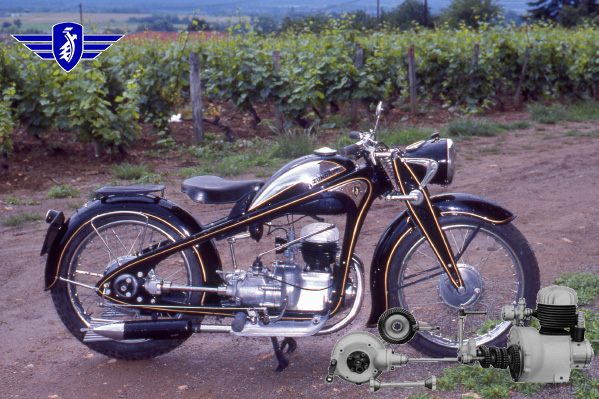
Photo ou archives : F-M. Dumas
2908
ZÜNDAPP
KK 200 - 1935
Expensive prestigious lightweight
Having built several two-stroke models, Zündapp then in full expansion launched its KK 200 in 1935. lt was a more powerful developed version of the K 200, from which it differed principally in having a pressed-steel frame, which saved a little weight. ("KK" the abbreviation of the German words for "little shaft-drive box-frame.")
Sophisticated but Costly
Zündapp had tried to create a lightweight equivalent of its prestigious K 800. Its single-cylinder engine was set across the frame, driving the back wheel through a dry plate clutch, a four-speed all-chain gearbox and a shaft final drive. Like most German models of those days, the KK 200 had no rear suspension. Its labor-intensive manufacturing made this low-powered machine expensive for the average purchaser.
First of a Famous Line
In 1936, it was replaced by a derivative bored out to 350cc, which had no greater performance but was even more expensive. The latter model was finally dropped from the catalogue in I 937 when it was replaced by the more conventional Derby 250. The KK 200 did not vanish entirely, however, for its frame was used as the basis for a 500cc overhead-valve flat-twin and was even used on the KKS 500 competition models. While it proved the frame's durability, it also showed that it had been too heavy for a little 200cc two-stroke! Though it found few customers, the KK 200 was the first of the famed "KK" models that made the name of Zündapp fapmous in the 1930s.
SPECIFICATIONS
Engine: 198cc (60x70 mm) air-cooled single-cylinder, coil ignition
Power Rating: 7 hp @ 3850 rpm
Valves: two-stroke
Fuel System: carburetor
Transmission: auto-type dry clutch; 4-speed chain transmission, shaft final drive
Suspension: pressed-steel girder forks (from); rigid (rear)
Brakes: drum (front & rear)
Wheels: 19 inch interchangeable wire
Weight: 290 lb
Maximum Speed: 50 mph
Only built over a two-year period, the little KK 200 was the first of the famed "KK" models that brought success to Zündapp before WWII.